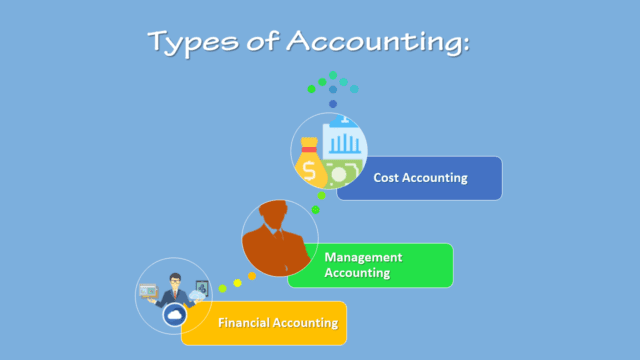Types and utility of Accounting; This article in we discuss first the utility of accounting after that we will finally discuss the types of accounting. So, What is the utility of Accounting? There are three types and utility of accounting: financial, management, and also cost accounting. The preceding section only brought the importance of information to the fore. Effective decisions require accurate, reliable, and timely information. The quantity and quality requirement of information differs with the importance of that decision which should take based on that information.
Here are explains; The utility and types of Accounting, discussion each one.
Individuals can use accounting information to manage and manage their bank accounts, to evaluate job eligibility in the organization, to invest money, rent a house, and manage their routine matters. Business managers have to set goals, evaluate progress, and start corrective action in case of adverse deviations from planned courses of action.
Many such decisions require accounting information – purchasing equipment, maintenance of inventory, borrowing, and lending, etc. Investors and creditors are willing to evaluate the profitability and solvency of a company before giving benefits to the company. Therefore, they are interested in obtaining financial information about the company in which they are considering an investment.
Financial statements;
Financial statements are the main source of information for them, which are published in a company’s annual report and various financial dailies and journals. Government and regulatory agencies have the responsibility to direct a country’s Socio-economic system in such a way that it promotes the common good. For example, the Securities and Exchange Board of India (SEBI) makes it mandatory to disclose some financial information to the public investment for a company.
The government’s task of managing the industrial economy becomes simpler if accounting information such as profit, cost, tax, etc. is presented uniformly without any manipulation or “window-dressing”. Central and state governments make various taxes Therefore, taxation officials must know the company’s income to calculate the amount of the company tax.
The information generated by accounting helps them in such calculations and also helps in finding any attempt to tax evasion. Employees and trade unions use accounting information to resolve various issues related to wages, bonuses, profit sharing, etc. Consumers and the general public are also interest in knowing the amount of income earned by various business houses.
Accounting information helps in determining whether a company is overcharging or exploiting customers, whether companies are showing better business performance or not, whether the country is emerging from the economic recession, etc. The aspects are closely related to accounting information and our quality of life.
What are the types of Accounting?
The financial literature classifies accounting into two broad categories, viz, Financial Accounting, and Management Accounting. Financial accounting is primarily concerned with the preparation of financial statements whereas management accounting covers areas such as interpretation of financial statements, cost accounting, etc.

Both these utility and types of accounting are examining in below;
Financial accounting:
As mentioned earlier, financial accounting deals with the preparation of financial statements for the basic purpose of providing information to various interested groups like creditors, banks, shareholders, financial institutions, government, consumers, etc. Financial statements, i.e. the income statement and the balance sheet indicate. How the activities of the business have been conducting during a given period of time.
Financial accounting is charge with the primary responsibility for external reporting. The users of the information generated by financial accounting, like bankers, financial institutions, regulatory authorities, government, investors, etc. want the accounting information to be consistent to facilitate comparison.
Therefore, financial accounting is based on certain concepts and conventions. Which include a separate business entity, going concern concept, money measurement concept, cost concept, dual aspect concept, accounting period concept, matching concept, realization concept, and conventions of conservatism, disclosure, consistency, etc. All such concepts and conventions would deal with detail in subsequent lessons.
Importance of financial accounting;
The significance of financial accounting lies in the fact that it aids the management in directing and controlling the activities of the firm and to frame relevant managerial policies related to areas like production, sales, financing, etc.
However, it suffers from certain drawbacks which are discussing below;
- The information provided by financial accounting is consolidating in nature. It does not indicate a break-up for different departments, processes, products, and jobs. As such, it becomes difficult to evaluate the performance of different sub-units of the organization.
- Financial accounting does not help in knowing the cost behavior as it does not distinguish between fixed and variable costs.
- The information providing by financial accounting is historical in nature and as such the predictability of such information is limited.
The management of a company has to solve certain ticklish questions like the expansion of business, making or buying a component, adding or deleting a product line, deciding on alternative methods of production, etc. The financial accounting information is of little help in answering these questions.
The limitations of financial accounting;
However, should not lead one to believe that it is of no use. It is the basic foundation on which other branches and tools of accounting analysis are based. It is the source of information, which can further analyze and interpreted according to the tailor-made requirements of decision-makers.
Management accounting:
Management accounting is ‘tailor-made’ accounting. It facilitates management by providing accounting information in such a way. So, that it is conducive for policy-making and running the day-to-day operations of the business. Its basic purpose is to communicate the facts according to the specific needs of decision-makers by presenting. The information in a systematic and meaningful manner.
Management accounting, therefore, specifically helps in planning and control. It helps in setting standards and in case of variances between planning and actual performances. It helps in deciding the corrective action. An important characteristic of management accounting is that it is forward-looking. Its basic focus is one future activity to perform and not what has already happened in the past.
Since management accounting caters to the specific decision needs, it does not rest upon any well-defined and set principles. The reports generated by a management accountant can be of any duration– short or long, depending on the purpose. Further, the reports can prepare for the organization as a whole as well as its segments.
Cost accounting:
One important variant of management accounting is the cost analysis. Cost accounting makes elaborate cost records regarding various products, operations, and functions. It is the process of determining and accumulating the cost of a particular product or activity. Any product, function, job, or process for which costs are determining and accumulate, are calls cost centers. The basic purpose of cost accounting is to provide a detailed break- up of the cost of different departments, processes, jobs, products, sales territories, etc. So, that effective cost control can exercise.
Cost accounting also helps in making revenue decisions such as those related to pricing, product-mix, profit-volume decisions, expansion of business, replacement decisions, etc. The objectives of cost accounting, therefore, can summarize in the form of three important statements, viz, to determine costs. To facilitate planning and control of business activities and to supply information for short- and long-term decisions. Cost accounting has certain distinct advantages over financial accounting. Some of them have been discussing succeedingly.
Cost accounting system;
The cost accounting system provides data about profitable and non-profitable products and activities, thus prompting corrective measures. It is easier to segregate and analyze individual cost items and to minimize losses and wastages arising from the manufacturing process. Production methods can vary to minimize costs and increase profits. Cost accounting helps in making realistic pricing decisions in times of low demand, competitive conditions, technology changes, etc.
Various alternative courses of action can properly evaluate with the help of data generate by cost accounting. It would not be an exaggeration if it is saying that a cost accounting system ensures maximum utilization of physical and human resources. It checks frauds and manipulations and directs the employer and employees towards achieving the organizational goal.







Leave a Reply